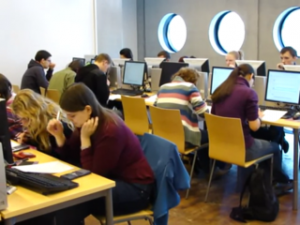Teaching
We teach physical, theoretical and quantum chemistry in Polish for the BSc and MSc students at the Faculty of Chemistry. We also offer a number of lectures and laboratory practices related to our research topics. Some of our courses are also available in English. The teaching materials are available at our University’s elearning platform (access limited to authorized users) eportal.pwr.edu.pl. The topics of BSc and MSc theses may be found in the University’s database at https://dyplomstudent.pwr.edu.pl.
 Our team members participate in eLearning activities at the Faculty of Chemistry. The Elearning Faculty Team was established at the initiative of then Dean prof. Ludwik Komorowski in June 2006. Since 2008 our team member Dr. Robert Góra is Dean’s elearning plenipotentiary. Currently, electronic tests are organized routinely as part of courses in general chemistry (each year about 800 students takes such electronic tests), physical chemistry, biochemistry and molecular biology. The database of electronic calculus problems in physics is used for electronic tutoring for the 1st year students. See the elearning page for more.
Our team members participate in eLearning activities at the Faculty of Chemistry. The Elearning Faculty Team was established at the initiative of then Dean prof. Ludwik Komorowski in June 2006. Since 2008 our team member Dr. Robert Góra is Dean’s elearning plenipotentiary. Currently, electronic tests are organized routinely as part of courses in general chemistry (each year about 800 students takes such electronic tests), physical chemistry, biochemistry and molecular biology. The database of electronic calculus problems in physics is used for electronic tutoring for the 1st year students. See the elearning page for more.
Ph.D. theses
Our faculty members offer a number of research topics for PhD theses. These include:
Prof. Wojciech Bartkowiak
- Quantum chemical calculations of dipole moments and polarizabilities of molecular systems in ground and excited states.
- Importance of the electron correlation in description of electronic structure of molecules in spatial confinement.
- Theoretical modeling of the barochromism phenomenon.
Dr. Robert W. Góra
- Theoretical studies of energy and charge transfer in light-harvesting systems.
- Theoretical studies on the origins of intermolecular interactions and excess electro-optic properties of model π-electronic complexes.
- Photochemistry and photophysics of hypothetical abiotic precursors of nucleotides.
Dr. Piotr Nowak
- Studies on the synthesis and properties of metallic nanostructures.
- Functionalization and stabilization of nanostructures, deposition in the liquid or solid matrices with pre-defined physicochemical properties, intended for use in medical and optoelectronics.
- Synthesis and study of physicochemical properties of concentrated sols of silver and its chosen salt.
- Photolytic, photochemical and chemical methods of obtaining nanostructures of metals and their chosen salts.
Dr. Krzysztof Strasburger
- Properties of systems with bound positron.
- Interactions of anti-hydrogen with ordinary matter.
- Influence of spatial confinement on nonlinear electric properties of small molecules.
 Our team members participate in eLearning activities at the Faculty of Chemistry. The Elearning Faculty Team was established at the initiative of then Dean prof. Ludwik Komorowski in June 2006. Since 2008 our team member Dr. Robert Góra is Dean’s elearning plenipotentiary. Currently, electronic tests are organized routinely as part of courses in general chemistry (each year about 800 students takes such electronic tests), physical chemistry, biochemistry and molecular biology. The database of electronic calculus problems in physics is used for electronic tutoring for the 1st year students. See the elearning page for more.
Our team members participate in eLearning activities at the Faculty of Chemistry. The Elearning Faculty Team was established at the initiative of then Dean prof. Ludwik Komorowski in June 2006. Since 2008 our team member Dr. Robert Góra is Dean’s elearning plenipotentiary. Currently, electronic tests are organized routinely as part of courses in general chemistry (each year about 800 students takes such electronic tests), physical chemistry, biochemistry and molecular biology. The database of electronic calculus problems in physics is used for electronic tutoring for the 1st year students. See the elearning page for more.